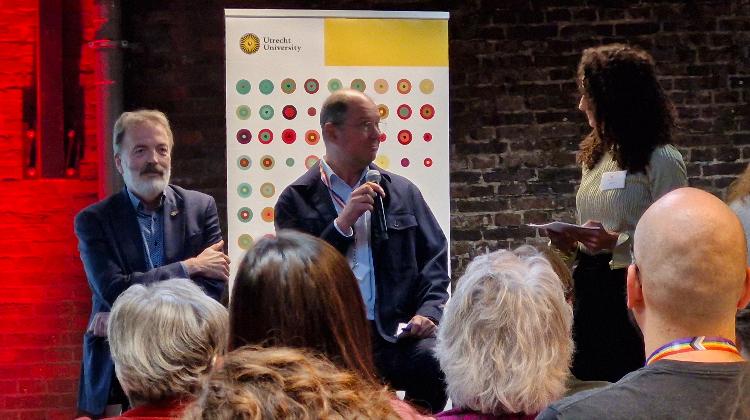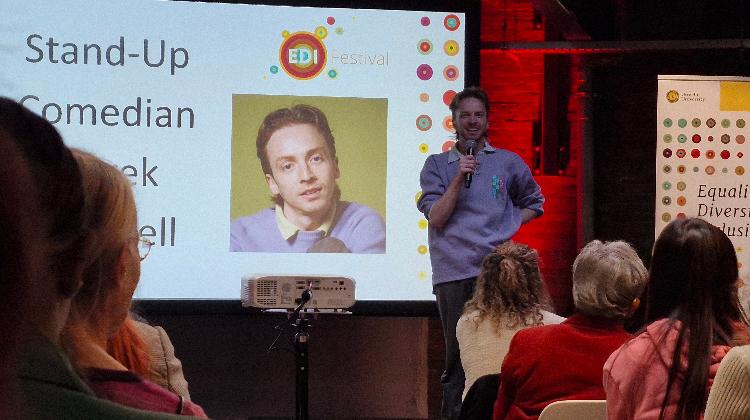Diversity programme seals the end of an era with a festival
EDI programme to be overhauled next year

“Since the EDI programme in its current format will officially end this year, we thought the best way to end it was to organise a festival where all colleagues could meet under one roof,” explains Elias Abou Chaaya, Event Coordinator at the EDI Office and one of the organisers of the EDI Festival, which happened on October 24. “We wanted to celebrate the achievements of the EDI programme, which was a temporary project, but at the same time highlight that a lot of work still needs to be done when it comes to diversity and inclusion,”
Diversity Dean John De Wit explains that the EDI strategy for 2020-2025 envisioned it as a dedicated programme, with a dedicated budget to organise events and hire staff, but things will change in 2025-2030. “The university will continue its focus on EDI, but we will not have a separate programme budget for it. The money for EDI and the employees’ time will now be integrated into the regular tasks of the university. This means that temporary positions that were directly funded from the programme budget will not be continued.” This includes the position of EDI Events Coordinator. “For me, the festival was the culmination of the 2.5 years of fantastic work of the EDI programme. It was a symbol of my appreciation and love for the EDI programme and everything it represents,” says Abou Chaaya.
“The people who were already embedded in the university organisation will stay”, De Wit continues. “This includes the EDI coordinator and the policy officers with HR as well as with Education, Research and Student Affairs, but their roles will be repositioned. They will perform EDI-related tasks as part of their regular work. The idea is also that people who haven’t been involved with EDI so far will do so as well. This way, EDI becomes everyone’s business.”
As for the budget, De Wit notes that EDI is affected by the government’s austerity measures like the rest of the university. “However, UU is doing as much as it can to limit cutbacks.”
It should be noted that the formal decision-making process has not been completed yet. The new EDI strategy and action plan, drafted with the help of an advisory committee that included external parties, is currently being finalised. Once it’s done, it will be submitted to the Executive Board and discussed by the University Council.
For this reason, De Wit can’t say much more about the plans right now. “What I can say is that ensuring that everyone feels included in our university community will take centre stage. Making sure that more first-generation students and students with a migration background start and complete their education at UU is also going to be a major objective.”

The comedian Derek Mitchell performed for UU employees at the EDI Festival. Photo: DUB
EDI Festival
It didn’t take long for the EDI Festival to achieve the limit of 250 registrations. “The registrations went through the roof very early on. I was over the moon,” says Diversity Dean John De Wit. Another 50 UU employees were on a waiting list to participate in the event, which happened on October 24 at De Lik, a building in the city centre that was used as a prison until 2014.
The programme included workshops, lectures and exhibitions about UU’s efforts to become more inclusive and how it can continue to do so in the future. The event lasted a whole afternoon and included three blocks with four lectures or workshops happening simultaneously. The topics ranged from sign language to neurodiversity to inclusive education and student recruitment.
“I’ve learned many new things and I’m very inspired. For example, I was just in the session about how to make student recruitment more inclusive and I learned that students at the HBO level are more likely to have a migration background, so aiming for HBO students is one way to make our student community more diverse”, says Maarke Roelofs, lecturer at the Graduate School of Life Sciences, one of the attendees. “I just wish the workshops were a little bit longer. They only lasted 45 minutes each, and then we needed to change rooms. I wish we could delve deeper into the topics and have more time for discussion.”
But it wasn’t all academic and serious: the programme also included fun options such as a workshop on voguing and a performance by the stand-up comedian Derek Mitchell, best known for the Instagram and TikTok profiles @letsdoubledutch, which pokes fun at the cultural differences between the Dutch, the British and Americans. “We wanted to build a sense of community and networking, and also make people laugh,” explains Abou Chaaya.
“It’s really good that the university organises a day like this. I hope it grows and becomes well known so that more people share what they do and we can inspire each other,” says Gwenda Frederiks, Education Advisor at the Faculty of Medicine, also in the audience.
Whether that’s going to happen, remains to be seen. “My ambition would be to do this once a year, similarly to the Education Parade,” says Diversity Dean John De Wit. “But it’s probably not going to be in the same format as the EDI Festival due to the budget. It would have to be a lighter version that would require less investment in terms of organising and costs.”